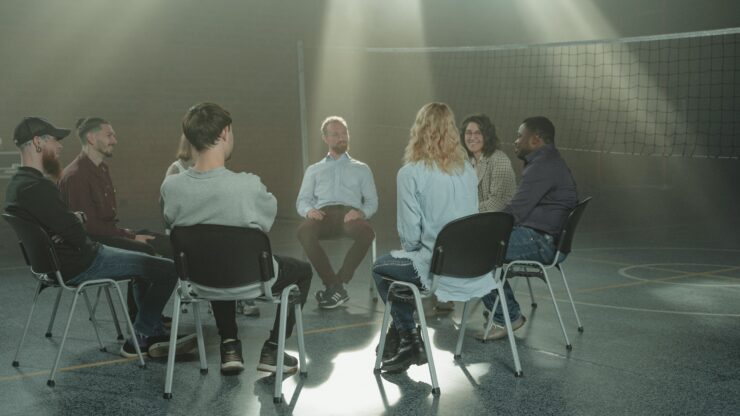BUILDING TRUST

Trust is one of the indispensable ingredients in discipleship and disciple making. It is woven into every detail of life. “In every conversation we have, every online order we place, every news article we read, trust is built or dismantled.”1 Trust has a startling impact on everything we do. It impacts our everyday life and experiences. In 2022, Trust Edge conducted a global study in all six continents of the world and the results indicate that trust matters now more than ever. “Institutional trust is extremely low from politics and media to education.”2 The church is not exempted from this malaise. Moral failure among church leaders and Christian workers raises trust questions.
Therefore, skepticism is on the rise both inside and outside the church as devastating global democracy, senseless wars, and moral failure take center stage, magnifying trust issues and amplifying a significant counter-force of trust: FEAR.3
In the midst of these challenges, we see windows of opportunities for discipleship and disciple making through building trust. We have seen trust make a dent in crisis situations, corruption, and intertribal wars in Africa. This creates hope that building trusting relationships for discipleship makes a difference. Trust is creating transformation in individuals and communities through discipleship. As disciple makers and the church build a culture of trust, we will continue to see more and more people and communities transformed by King Jesus.
In the process of discipleship and disciple making, high-trust relationships outperform low ones. High-trust relationships create a psychological safety environment for impact discipleship and disciple making.
This issue explores how to build trust in intentional discipleship relationships, including practical steps on how to build trust in discipleship. The scientific and theological literature on building trust is limited. Plenty of research exists examining the importance of trust and what it is, but that study doesn’t tend to lay out practical steps for building trust in the process of discipleship. Therefore, much of the research supporting the following discussion is from my personal reflections and web sources, not journal articles.
WHAT IS TRUST?
Trust is the capital in all relationships and strong communities. It is the cement that keeps relationships together. It is one’s competitive advantage in the process of discipleship and disciple making. Trust is tangible, learnable, and measurable. It is as a confident belief in someone or something to do what is right, deliver what is promised, and to be the same every time in spite of the circumstances.
HOW DO WE BUILD TRUST?
Building trust is a process involving daily action steps and practices. Trust Edge identifies eighteen daily activities that help build trust. Because of limited space, we will state a few:
- Make and keep promises.
- Stop talking and really listen.
- Get feedback .
- Apply relevant feedback.
- Create a habit of genuinely praising others.
- Think beyond yourself. Getting in the habit of doing is what is best for the whole.
- Be intentional about being a continuous learner.4
WHAT ARE THE MARKS OF A TRUSTWORTHY PERSON?
In the process of accompanying individuals and groups in discipleship to Jesus over the years, I have identified and developed a list of twenty-two marks of trustworthy people to guide me and those I disciple. A few of them are listed below. Trustworthy people have the following traits:
- They are not greedy or desperate for money. They value people, and their relationships with them, more than material things, no matter how much they want them.
- They are ready to share their resources with others.
- They don’t hoard information. They are selfless.
- They are compassionate and empathetic. They will not intentionally hurt anyone. They will not betray anyone no matter the circumstance.
- They are consistent in their behavior and keep their word even when situations tempt them to go back on their word.
- A trustworthy person will never pretend to be someone else just to impress others.
- Trustworthy people are humble enough to admit that they don’t know everything and are willing to learn. They seek people’s advice and opinions to avoid mistakes.
- They promote communication and understanding and ensure they understand others properly to avoid assumptions of any kind.5
WHAT ARE THE PILLARS OF TRUST?
Based on the above discussion it is clear that trust is earned and not given. Trust Edge has identified eight pillars of trust. Although these pillars were intended for the corporate environment, they are applicable within the context of discipleship. These eight pillars are:
- Clarity: In discipleship and disciple making, people trust the clear and mistrust the ambiguous. Clarity unifies, motivates, and increases morale which leads to trusted discipleship and disciple making.
- Compassion: In discipleship, people put faith in those who care beyond themselves. Caring leads to trust. Think beyond yourself and put people before things to improve the culture of trust in discipleship.
- Character: In discipleship, people notice those who do what is right over what is easy. Building integrity takes work, but gives the biggest reward. As a disciple of Jesus and a disciple maker always ask yourself, “Is this the right thing?”
- Competency: In discipleship, people have confidence in those who stay fresh, relevant, and capable. Stretch your mind with new ideas, fresh thoughts, and different perspectives. Find a circle of other disciple makers with whom you can grow and find a mentor who is successful in disciple making or wise in the same ways you would like to be.
- Commitment: In discipleship, people believe in those who stand through adversity. In this instance, actions definitely speak louder than words. So, if you say something that matters to you, be prepared to show it to the disciple whose trust you want. It can mean demonstrating tenacity to see things through to the end.
- Connection: In discipleship, people want to follow, buy from, and be around those who are willing to connect and collaborate. Ask questions, not only of those you are discipling, but also of those in your community, and be sure to listen attentively to their answers.
- Contribution: In discipleship, people immediately respond to results. Give your attention, resources, time, opportunity, and talent. Ultimately, you must deliver results in discipleship and disciple making in order to be trusted.
- Consistency: In discipleship, people love to see the little things done consistently. The track record of trust is built over time; there is no other way to lasting success in discipleship and disciple making.6
HOW DO WE BUILD CHARACTER THAT ENGENDERS TRUST?
Much has been written on character transformation from Scripture and social science literature. To build character the disciple maker must:
- Be humble. Humility is the beginning of wisdom. Live out your principles and values—wherever you are to “love God and your neighbor as yourself,” or “do the right thing,” living by your principles makes decision making easier and your character more steadfast.
- Be intentional. Integrity does not just happen. We are all products of our thoughts and habits. Therefore, as a disciple of Jesus, you must be intentional about filling your mind with good thoughts (Phil. 4:8). Creating a habit of this internalizes principles and breeds high character.
- Practice self-discipline. Being of high character takes the ability to do what is right over what is easy.
- Be accountable. Surround yourself with people who have high expectations for you, be responsible to yourself first, lose the pride. Open yourself up for accountability.
[1] www.TrustEdge,com, accessed April 2nd, 2023
[2] Ibid.
[3] Ibid.
[4] Ibid.
[5] Felix Niba, Marks of a Trustworthy Person, 2021.
[6] www.TrustEdge.com, accessed on April 2nd, 2023
This post originally appeared at: Building Trust — The Bonhoeffer Project
If you have enjoyed reading this, please consider joining our email list!











